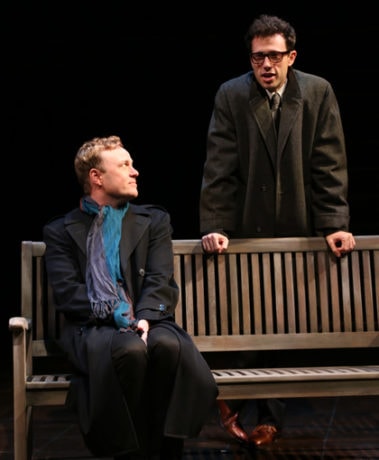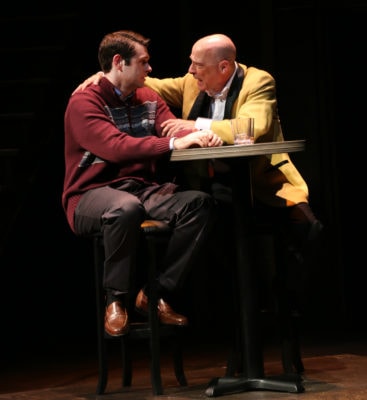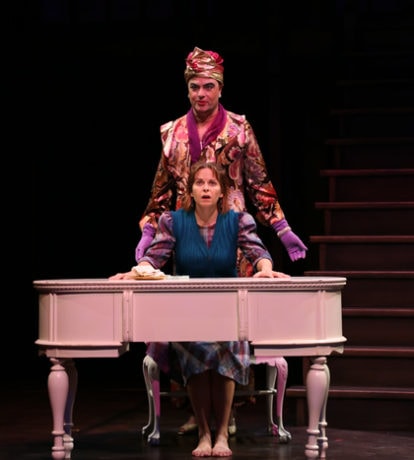Post-Play Palaver is an occasional series of conversations between DC Theater Arts writers who saw the same performance, got really into talking about it, and decided to continue their exchange in writing. That’s what happened when Senior Writers and Columnists Michael Poandl and John Stoltenberg (Magic Time!) saw the new production of Angels in America: Part One: Millennium Approaches, a co-production of Round House Theatre and Olney Theatre Center.

Michael: Wow, there is so much to talk about. I’m glad I’m not writing on this show because I would probably send Joel something closer to a treatise than a review. Before I even get into the thematics and impact and relevancy of the play, I have to give at least a cursory shoutout to the tremendous production quality. I can’t remember the last time I was so uniformly impressed by a cast, director, and design team (is it too early to start making Helen Hayes predictions?). I felt more refreshed when I got home at 12:30 AM than I was before lights up. So, it’s a great show and everyone should see it.
John: I agree this show is must see. It was a thrilling performance and a superb production. I just love basking in Kushner’s language, drowning in his discourses, being tickled by his playfulness, feeling my conscience pricked by his sardonic barbs. I love the literateness and intelligence he imparts to his characters. I loved watching such a terrific cast bring it to life.
Michael: Oh yeah, there’s a reason this thing won the Pulitzer Prize (among a gaggle of other major awards). The language is entrancing. So, I wanted to start by talking about how and why, after an unbelievable 25 years, Angels in America is still relevant. Notice I didn’t ask whether it was still relevant—that seemed self-evident to me by the sheer depth of intellectual and emotional engagement that the audience was clearly experiencing. That level of explosive response was too deep for the play to be irrelevant in any sense of the word. But the question of how precisely it is relevant is important, and not immediately obvious to me. In an age where AIDS has been blessedly de-fanged by modern medicine, what does the legacy of the early HIV epidemic have to teach us? In a time when our African American president projects rainbow light onto the White House to celebrate the legalization of gay marriage, what does Angels have to say about being gay in America? And in a country that is increasingly secular and religiously diverse, what does Tony Kushner have to tell us about the role of religion, ideology, mythology and spirituality in the Land of the Free?

John: I remember seeing the Broadway production directed by George C. Wolfe in the 1990s, when HIV infection was still a death sentence. “Living with HIV” was inconceivable. And living with AIDS anxiety was just what you did every day if you were gay. The fact that Kushner transformed the health, emotional, and political crisis of that time into this “gay fantasia on national themes” is still to me an astonishment as an act of art. For me, seeing the kaposi sarcoma lesions on Tom Story’s body as his character Prior succumbs was like rewatching old documentary footage of a conflagration that felled legions of battle buddies but by some fluke I survived. There was just no way to detach from the personal relevance of the revelation of unearned grace that had spared me. I doubt Kushner could have imagined how this play would play in 2016. He couldn’t have; back then there was no future. I don’t know what other gay men of my generation will feel revisiting that dire time when they see the new Round House/Olney production—but to any who might have qualms or hesitation about reopening deep wounds, I say; Go. You must. You owe it to yourself and all those we lost to remember in grief where we have been and in gratitude where we have come.
Michael: Thank you for your entreaty and for sharing your experience. I literally can’t imagine living in a world where all my friends are dying around me and society at large is either indifferent or outright hostile. Living in a liberal place at this moment in history it’s easy to forget where we came from. So, if for your generation Angels is about grief and healing, for my generation it’s about humility and understanding. People literally had to die so that we could be accepted and have access to the same rights and healthcare as everyone else. You alluded to the full title of the work, which I was only reminded of afterwards: Angels in America: A Gay Fantasia on National Themes. And when I actually looked up the word “fantasia” I was surprised: “a musical composition with a free form and often an improvisatory style” or “a thing that is composed of a mixture of different forms or styles.” And just like that, something clicked for me. Angels is so broad and sweeping and polymorphous because it is deliberately a mashup of different theatrical traditions. Some moments are as authentic and quotidian as the most realistic Chekhov or Arthur Miller. But then an angel crashes through the fucking ceiling and it’s like, oh hello Brecht where did you come from? And although it is most certainly a gay play, the thematic landscape is much broader than gay rights or AIDS.
For me, there were two acting moments in particular that highlighted the universal resonance of this play. First, there is the scene where Belize (Jon Hudson Odom, who summarily steals every scene he’s in) visits Prior Walter (Tom Story, in a transcendent performance) in the hospital. After a sparkling back-and-forth between the two old friends, Prior’s facade cracks and his vicious sense of abandonment and loneliness spontaneously bursts forth. That sense of loss and heartbreak is, unfortunately, not limited to a particular decade or sexual orientation.

The second is when Roy Cohn reveals the part he played in the execution of Ethel Rosenberg to Joe (Thomas Keegan). Mitchell Hébert plays Roy with a positively Shakespearean ferocity, and this scene is one of the best examples of that. Well, this being Election Season in Washington, I couldn’t help but think about how the real Roy Cohn was Donald Trump’s lawyer. More than that, he was a friend and a mentor to the current Republican presidential nominee. In so many ways, Trump’s pronouncements over the past year seem like a watered-down version of Roy Cohn’s macho take-no-prisoners approach to life. In another time I may have cited this quintessential 1980’s attitude as an example of how Angels is dating itself. But in 2016, the Masters of the Universe are back, I suppose, this time on the campaign trail.
John: You’re right. And I doubt the Roy Cohn character Kushner created has ever seemed scarier and more dangerous than today, knowing what we know now. I felt that Hébert’s fine performance was in a fascinating time-travel conversation with current views on Cohn. McCarthyism was a long time ago as American memories go. In Hebert’s portrayal, Trumpism was more the subtext.
I want to add my own admiration for Odom’s performance. There’s a scene in Act Two in a coffee shop between Louis and Belize. As written it’s Louis holding forth in a discursus on themes of liberalism and race, interrupted by a few “Uh-huh”s from Belize. It’s hilariously self-involved. But the listening that Odom does there is scene-stealingly amazing. It’s as if he delivers wordlessly a compendium of black takedowns of unselfconscious white privilege.
Michael: I totally agree. Odom is amazing in that scene, with so much righteous anger bubbling just under the surface, conveyed almost entirely without words. Belize has the difficult task in Angels of single-handedly reminding the audience that race exists as a factor in America. To the credit of directors Jason Loewith and Ryan Rilette, they also cast the wonderful Dawn Ursula in a variety of roles, including the Angel, so there’s at least a little more diversity in the cast. But really it’s Belize who raises racism as an issue, and Odom does so in a way that’s smart and hilarious and deeply cutting. I should also mention that Jonathon Bock as Louis is painfully good at portraying the over-educated yet completely ignorant coastal liberal type. He shrouds his guilt in flowery intellectualizations about Hegelian positivism and American democracy, and Belize just totally brings him back down to earth.
This may be a bit of a digression (but then again this is supposed to be a palaver) but this production was the first time I noticed the recurring motif of drag in Angels. Prior has a dream where he’s dressed in drag, but he and Belize also allude to the fact that they used to dress in drag and then stopped, seemingly as a sign of maturity or political correctness. Then, Belize refers to herself as an “ex-ex-drag queen” to Louis and he criticizes that as a practice that brings down the gay community or something. It just piqued my interest because I’ve never thought about drag in those terms, or with any sort of larger implication. I’m wondering if this is a generational thing within the gay community, and if so, has that discussion changed as the result of a broadening conversation about gender and trans rights? And in the context of Kushner’s play, does drag play any sort of symbolic role?
John: There was at one time in some circles a feminist critique of drag for caricaturing and demeaning women. I can’t say why it is no longer as influential as it once was. (It may have mutated into the faction of radical feminism that is misguidedly antipathetic to trans women.) But it would have been in the air about the time Kushner was writing Angels. I too noted that mention as it flew by, and it struck me as one of many fly-by references in the script to political conversations that were going on then, that Kushner would have been alert to, but that aren’t so obvious in the activist zeitgeist now. (There’s probably a Ph.D. dissertation there.) As I recall, the late-1970s, early-1980s feminist critique of drag didn’t have much traction with white urban gay men generally, among whom there was fairly vocal antifeminism. (During the AIDS crisis, when legions of lesbians selflessly came to the aid of gay men, the virulence of that antifeminism subsided.)

But there’s a lot of evidence in Angels that Kushner was consciously attuned to feminist conversations of the time. (He’s a wonderful omnivore in his consumption of anti-oppression political ideas.) There are fewer female characters in Angels than male ones, but I could sense reflected in each of the women’s roles traces of Kushner’s paying attention to what radical women were then talking about. And it was a delight to watch Kimberly Gilbert, Sarah Marshall,and Dawn Ursula discover and deliver those glimpses with thoroughly contemporary conviction.
Michael: Fascinating. One of the reasons Kushner is so exciting for me is because he makes things like radical leftist theory visceral and dramatic (especially in Part II: Perestroika, which I am so looking forward to seeing). Actually, that’s one of the reasons I love Hamilton too, because it feels like a bunch of artists made the nerds cool by jazzing up American history. And Kushner isn’t just making his characters cool—he places them in this grand context. They’re not just individuals as such, but rather they represent larger, cosmic forces. It makes for an epic play in the truest sense of that word, and most lesser writers (and directors and designers and casts) could probably not pull it off. It is to Round House and Olney’s great credit that they decided to do both parts of Angels in America in rep. I really want to go to one of the Saturdays where they do a matinee of Part I and then Part II in the evening. It’s like nine hours of theatre and I can’t think of anything better.Want to join?
John: You bet!
Running Time: Three hours, with two 15-minute intermissions.
Round House Theatre and Olney Theatre Center’s Angels in America: Part 1: Millennium Approaches plays through October 30, 2016 at Round House Theatre -4545 East-West Highway, in Bethesda, MD. For tickets, call the box office at (240) 644-1100, or purchase them online.
Angels in America: Part 1: Millennium Approaches is presented in alternating repertory with Angels in America: Part Two: Perestroika.
LINKS:
Review: ‘Angels in America: Millennium Approaches’ at Round House Theatre and Olney Theatre Center by David Friscic.
Spine: Anguish, Angels, and the Reagan Revolution: ‘Angels in America’ at Round House Theatre by Robert Michael Oliver.
Post-Play Palaver: John Stoltenberg and Michael Poandl on ‘Angels in America: Millenium Approaches’ at Round House Theatre and Olney Theatre Center.





